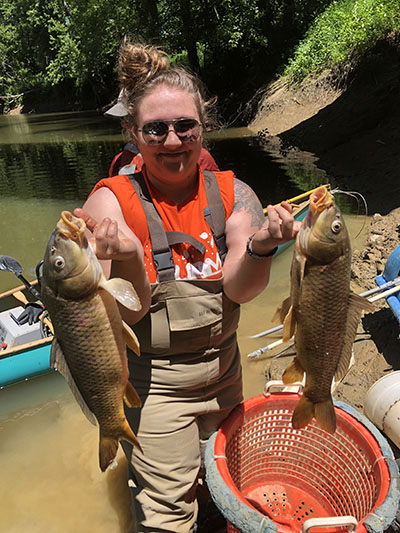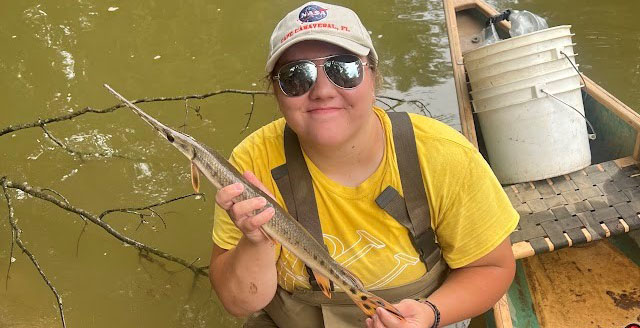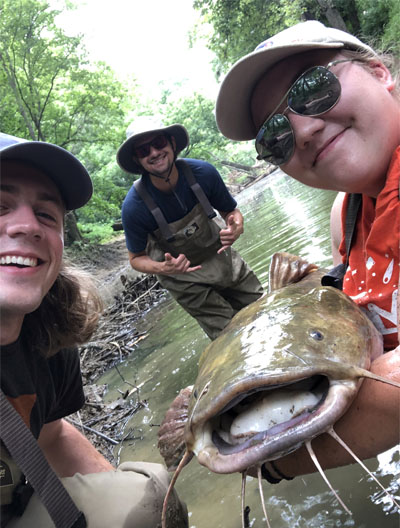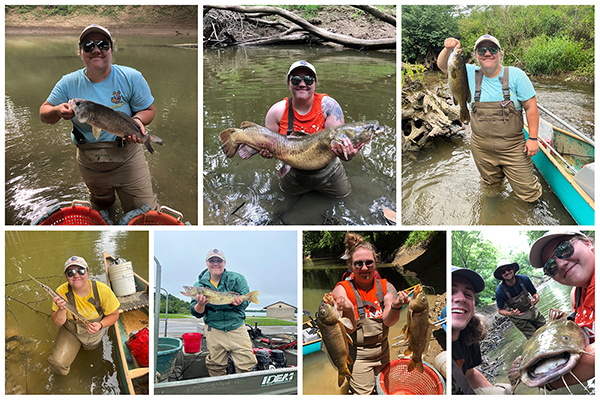FNR Field Report: Kirsten Adams
Students from Purdue Forestry and Natural Resources took their classroom knowledge to the field for summer internships and paid positions across the country, gaining valuable experience, hands-on training and career guidance. The FNR Field Reports series will offer updates from those individuals as summer positions draw to a close.
Senior aquatic sciences marine and freshwater biology major Kirsten Adams was a Governor’s Summer Intern with the Indiana Department of Environmental Management (IDEM).
In this role, Adams worked with numerous research crews on a variety of topics. While the majority of her summer was spent conducting fish community sampling at various sites throughout the state, Adams also participated in fish tissue sampling, macroinvertebrate sampling and temperature logging efforts.
During the fish community sampling, Adams and her colleagues used electrofishing equipment. They then sorted the fish they collected and weighed and measured them before returning them to the stream.
These activities allowed Adams was put her FNR studies to use in real-world situations.
“My FNR studies played a massive role in my internship,” Adams said. “I took and TA’ed for the Fish ID course (FNR 24250 – Laboratory in Ecology and Systematics of Fishes, Amphibians and Reptiles) and applied the skills I learned every day during the summer. My fish identification skills were fine-tuned throughout the summer and having that background gave me an additional skill that few others had entering the internship. I also used the sampling experience I gained from Summer Practicum and my Aquatic Sampling Techniques (FNR 35100) course. I knew what to expect with the electrofishing process and how to properly measure the fish. Teamwork and adapting to adversity were also central points of focus at Practicum, which I applied every day during my internship as well. I truly believe that my experiences in FNR put me a step ahead of my colleagues over the course of my internship.”
Aquatic Sampling Techniques (FNR 35100) course. I knew what to expect with the electrofishing process and how to properly measure the fish. Teamwork and adapting to adversity were also central points of focus at Practicum, which I applied every day during my internship as well. I truly believe that my experiences in FNR put me a step ahead of my colleagues over the course of my internship.”
In addition to putting classroom skills to use, Adams was exposed to what a career in aquatic sciences may entail.
“I learned a lot about what life after college may look like for me, the highs and lows of fieldwork, professionalism, and more than I cared to about how healthcare works,” Adams shared. “Fieldwork can be very physically challenging. The days are long and hot, the equipment is heavy, and sometimes the fish variety at the sites is disappointing. I was definitely pushed physically, but in the end it was worth it. Another challenging part of fieldwork is being away from home so much. Often we would go on overnight sampling trips and I would not be able to sleep in my own bed for most of the week.”
 Despite its challenges, the experience also brought many positive moments and exposed the Greensburg, Indiana, native to diverse people and points of view.
Despite its challenges, the experience also brought many positive moments and exposed the Greensburg, Indiana, native to diverse people and points of view.
“My favorite part of the job was sorting the fish after we electrofished. It was so exciting to see new species or species that I had only ever seen in a field guide.” Adams recalled. “I was also able to get a taste for what it’s truly like to work with a variety of different people. Because I have primarily had classes with and interacted with FNR people, I think I got used to a certain type of person with the same interests as me. Working for IDEM allowed me to work with people majoring in engineering, policy, ecology, and many more. Some folks I worked with had gone to graduate school and gotten master’s or doctorate degrees, while others had not pursued academia beyond their bachelor’s degree. I got to see what Purdue and the world looks like from other perspectives and enhance my knowledge. Overall, my experience was incredibly educational, and I enjoyed every moment (except for the moments that required me to haul a 100-pound generator to a site a mile away).”
Working for IDEM gave Adams, who has a crop science minor and is working towards and entrepreneurship certificate, confirmation of her career goals.
“This internship solidified the fact that I want to work in environmental management and focus on aquatic sciences,” Adams said. “I really enjoyed being hands-on with a lot of fish every day and being out in the field. I also appreciated the fact that I spent a minimal amount of time doing office work. It made me see that I may enjoy a job working for the state or federal government.”
 Senior aquatic sciences major Kirsten Adams pictured with a variety of fish she caught during fish sampling at her summer internship with the Indiana Department of Environmental Management.
Senior aquatic sciences major Kirsten Adams pictured with a variety of fish she caught during fish sampling at her summer internship with the Indiana Department of Environmental Management. 





